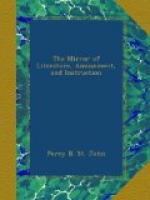Since his retirement, Sir Humphry Davy resided principally at Rome, where a short time ago he had an alarming attack of a paralytic nature, but from which he was apparently, though slowly, recovering. Lady Davy, who had been detained in England by her own ill health, joined Sir Humphry, at Rome, on hearing of his alarming state. Thence he travelled by easy stages to Geneva, without feeling any particular inconvenience, and without any circumstances which denoted the approach of dissolution: but on Friday, May 29, 1829, the illustrious philosopher closed his mortal career, in the fifty-first year of his age, having only reached Geneva on the day previous. Lady Davy had the gratification of contributing, by her soothing care, to the comfort of his last days during their stay in Italy, and on their journey to Geneva, where they intended to pass the summer, and hoped to have derived benefit from the eminent practitioners of that city. Sir Humphry had also been joined by his brother, Dr. John Davy, physician to the forces in Malta, whence he came on receiving the intelligence of his brother’s danger. But all human art and skill were of no avail. The last and fatal attack took place at half-past two on Friday morning, and the pulse ceased to beat shortly after. The event was no sooner known, than the afflicted widow received the condolence and affectionate offer of services from the most distinguished individuals of Geneva; amongst whom we must mention M. A. de Condolle, the eminent botanist, and M. Sismondi, the historian, both equally beloved for their amiable character, as illustrious throughout Europe for their works. M. de Condolle obligingly took charge of all the details of the interment of his illustrious colleague; and the governor of the Canton, the Academy of Geneva, the Consistory of the Geneva Church, the Society of Arts and of Natural Philosophy and History, together with nearly all the English resident there, accompanied the remains to the burial-ground, where the English service was performed by the Rev. Mr. John Magers of Queen’s College, and the Rev. Mr. Burgess. The members of the Academy, in the absence of any relation of the deceased, took their place in the funeral procession; and the invitations to the syndicate, and to the learned bodies who accompanied it, were made by that body in the same character. The whole was conducted with much appropriate order and decency, and whilst every attention and respect were paid to the memory of the deceased, nothing was attempted beyond the unostentatious simplicity which the deceased had frequently declared to be his wish, whenever his mortal remains should be consigned to their last home; and which in accordance to that wish, had been expressly enjoined to her kind friends by the afflicted widow. In the procession, which followed the corporate bodies and the countrymen of the deceased, were many of the most eminent manufacturers of Geneva, and a large body of mechanics, who were anxious to pay this tribute of regard and gratitude to one whom they deservedly looked upon as a great benefactor to the arts, and promoter of sciences, by the application of which they earn their livelihood.[4]




